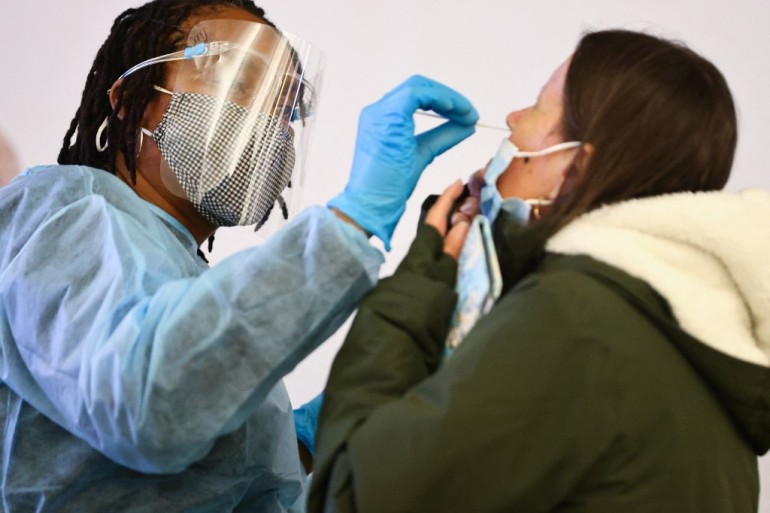All you need to know about the symptoms of Omicron
The key difference between Omicron and other variants is the absence of the loss of taste and smell in this new variant, which is causing concern around the world once again. Infection specialists believe that there’s probably a significant amount of “overlap” between Omicron and the prior variants, because they are essentially doing the same thing.
Yet, scientists have zeroed in one major difference. Omicron seems to have a shorter incubation time, for instance, after a person is exposed, it takes as few as three days for them to develop symptoms, become contagious and test positive. Compare this with the delta and the original coronavirus – symptoms start appearing in patients after four to six days. This is probably because the variant’s mutations help it to attach and go inside cells, said reports.

On November 26, 2021, the WHO designated the variant B.1.1.529 as a variant of concern, named Omicron, following the advice of the WHO Technical Advisory Group on Virus Evolution (TAG-VE). This decision was based on evidence presented to TAG-VE that Omicron has several mutations that may have an impact on its behavior, for example how easily it spreads or the severity of the disease it causes. Here is a summary of what is currently known.
Current knowledge about Omicron
Researchers in South Africa and around the world are conducting studies to better understand many aspects of Omicron and will continue to share the results of these studies as they become available.
Communicability: It is not yet clear whether Omicron is more transmissible (ie spreads more easily from person to person) compared to other variants, including Delta. The number of people who have tested positive has increased in areas of South Africa affected by this variant, but epidemiological studies are underway to understand whether it is due to Omicron or other factors.
Severity of illness: It is not yet clear whether infection with Omicron causes more severe illness compared to infections with other variants, including Delta. Preliminary data suggest that there are increasing rates of hospitalization in South Africa, but this may be due to an increase in the overall number of people becoming infected, rather than a specific infection with Omicron. There is currently no information to suggest that the symptoms associated with Omicron are different from those of other variants. The initially reported infections were among college students, younger individuals who tend to have milder illness, but understanding the severity level of the Omicron variant will take days to several weeks. All variants of COVID-19, including the Delta variant that is dominant worldwide, can cause serious illness or death, particularly for the most vulnerable people, so prevention is always key.
Efficacy of prior SARS-CoV-2 infection
Preliminary evidence suggests that there may be an increased risk of reinfection with Omicron (i.e., people who have previously had COVID-19 could be more easily re-infected with Omicron), compared to other variants of concern, but information is limited. More information on this will be available in the coming days and weeks.
Vaccine effectiveness: WHO is working with technical partners to understand the potential impact of this variant on our existing countermeasures, including vaccines. Vaccines remain critical in reducing severe illness and death, even against the dominant circulating variant, Delta. Current vaccines remain effective against severe disease and death.
Efficiency of current tests: Widely used PCR tests continue to detect infections, including infection with Omicron, as we have also seen with other variants. Studies are underway to determine if there is any impact on other types of tests, including rapid antigen detection tests.
Effectiveness of current treatments: Corticosteroids and IL6 receptor blockers will continue to be effective for the management of patients with severe COVID-19. Other treatments will be tested to see if they remain as effective given the changes to parts of the virus in the Omicron variant.
Studies in progress
The WHO is currently coordinating with a large number of researchers around the world to better understand Omicron. Studies currently underway or soon include evaluations of transmissibility, severity of infection (including symptoms), performance of vaccines and diagnostic tests, and efficacy of treatments.
WHO encourages countries to contribute to the collection and sharing of hospitalized patient data through the WHO COVID-19 Clinical Data Platform to quickly describe clinical characteristics and patient outcomes.
More information will emerge in the coming days and weeks. The WHO TAG-VE will continue to monitor and evaluate data as it becomes available and assess how mutations in Omicron alter the behavior of the virus.
Is Omicron milder than others?

Last week, South Africa released some data which showed that risk of hospitalisation for adults diagnosed with Omicron was 29 per cent lower there than in the first wave of the pandemic. Also, hospitalised South African C-19 patients have been less likely to be admitted to intensive care units.
Meanwhile, Britain’s public health agency too released preliminary data which suggested that people with the Omicron variant of the coronavirus are between 50 per cent and 70 per cent less likely to need hospitalisation than those with the Delta strain. It cautioned that the analysis is “preliminary and highly uncertain” because of the small number of Omicron patients in hospitals and the fact that most belonged to a younger age group.
Omicron and other variant symptoms vary depending on a person’s vaccine status
If a person is vaccinated and has Delta or the original coronavirus, their symptoms will include headache, congestion, sinus pressure and sinus pain.
Unvaccinated patients will have shortness of breath and cough, along with flulike symptoms.
Vaccinated Omicron patients suffer from headaches, body aches and fever — “like a really bad cold.”
While unvaccinated Omicron people have the same shortness of breath, cough and flulike symptoms like in unvaccinated people with Delta and the original coronavirus.
According to recent ZOE data based on a London study, the top five Delta symptoms if you’ve had two vaccinations are:
- Headache
- Runny nose
- Sneezing
- Sore throat
- Loss of smell
The top 5 Omicron symptoms were:
- Runny nose
- Headache
- Fatigue (mild or severe)
- Sneezing
- Sore throat
- Loss of appetite and brain fog were also identified as common symptoms.
Bottom-Line:
Scientists have also said that Omicron can impact the patient severely as well. Sometimes, early mild symptoms can develop into serious symptoms later, so it’s crucial that people with cold or flu-like symptoms be tested and stay at home. After all, the pandemic has still not left us.